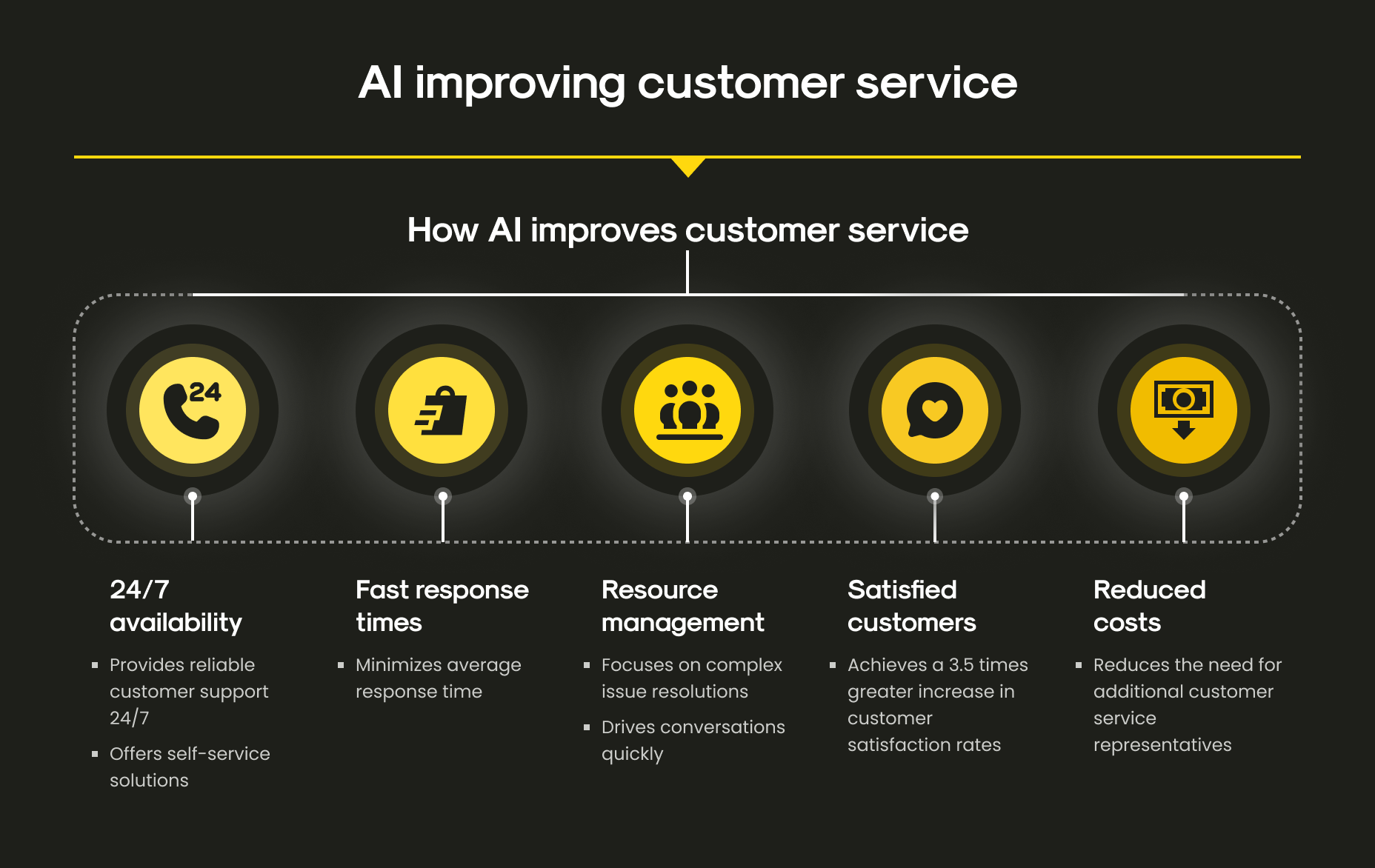Modern customers don’t want to wait: they expect clear answers the moment they ask. AI chatbots deliver just that: they need no coffee breaks, and provide instant smart help whenever it’s needed. This nonstop availability powers higher satisfaction, loyalty, and revenue growth.
Besides, AI chatbots bring consistency and personalization at scale. They remember customer preferences, adapt responses based on past interactions, and handle thousands of conversations simultaneously without missing a beat. This means every customer feels heard and valued, a great thing in itself. In other words, chatbots are turning routine support into meaningful engagement that keeps clients coming back. In this article, you’ll find out:
- Why 24/7 chatbot availability is reshaping customer expectations and reducing cart abandonment
- How AI-powered bots personalize shopping with recommendations, promotions, and tailored support
- The most impactful use cases in e-commerce: product discovery, order tracking, returns, and upselling
- How natural language processing makes chatbot conversations feel human, building trust and loyalty
- The common pitfalls in chatbot design (and how to avoid “robotic” frustration traps)
- Why AI chatbots aren’t just a support tool but a revenue driver through efficiency, retention, and insights
- How Mitrix helps brands design, integrate, and scale e-commerce chatbots that deliver measurable results
The 24/7 advantage: always on, always ready
Unlike people who clock out, AI chatbots work 24/7, offering immediate responses and global coverage. As of today, this isn’t just convenience, it’s a competitive edge.
Here’s the thing: 74% of shoppers now prefer chatbots over human support for simple issues, according to recent studies. The reasons are obvious: chatbots are faster, available anytime, and resolve straightforward questions without fuss. That means fewer abandoned carts, happier customers, and more completed sales.

AI improving customer service
Key takeaway
With 24/7 availability, chatbots meet growing customer expectations for instant support and convenience. This shift not only reduces wait times and operational costs but also leads to fewer abandoned carts and more completed purchases. When thoughtfully implemented, AI chatbots become powerful partners in enhancing satisfaction, driving loyalty, and scaling support without sacrificing quality.
Use cases in e-commerce: beyond basic support
In fact, modern AI chatbots go far beyond basic question-answering. They:
- Personalize product recommendations
- Automate order tracking and returns
- Drive upselling and cross-selling
- Resolve common issues instantly
Notably, companies that integrate chatbots report increased customer loyalty and repeat purchases, driven by smooth, responsive experiences. Let’s break down the most common use cases, shall we?
AI-powered ecommerce chatbots are transforming digital shopping experiences with speed, personalization, and intelligence. Their versatility allows them to plug into various stages of the customer journey, creating smoother, smarter interactions. Let’s explore some of the most impactful ways ecommerce brands are putting chatbots to work, and winning big.
1. Answering personalized customer questions
Chatbots aren’t just answering FAQs anymore: they can handle nuanced queries that would typically require a human touch. Whether it’s clarifying shipping timelines, explaining return policies, or finding matching accessories for a recent purchase, chatbots offer quick, accurate answers.
Imagine a customer browsing for a winter jacket who asks if a particular style comes in their size or matches with boots they just bought. An AI chatbot can immediately respond with personalized recommendations based on current inventory, purchase history, and even style preferences in real time. Instead of clicking through menus or waiting on hold, customers get smart, contextual help instantly. That convenience reduces friction and encourages longer shopping sessions.
This way, AI-driven chatbots act as digital sales associates, guiding users with the same helpful tone and product knowledge they’d get in a physical store.
2. Guiding product discovery
Helping customers find the perfect product is where ecommerce chatbots truly shine. Acting like personal shopping assistants, they initiate dynamic conversations that feel natural and intuitive.
For example, a home decor store chatbot might ask a few key questions about style preferences, color schemes, and room dimensions. Based on this input, the bot can showcase matching items in real time, suggest bundles, or even upsell complementary products. This makes the discovery phase feel more like a curated experience than a search engine chore.
Retailers in niches like sportswear, skincare, or electronics can use chatbot prompts to segment users by lifestyle, goals, or environment. This smart filtering keeps the experience relevant and highly engaging, reducing choice paralysis and leading to faster, more confident purchases.
3. Streamlining order tracking and returns
No customer enjoys tracking down an order update or initiating a return, but chatbots make these steps painless. Integrated with backend systems, ecommerce chatbots can retrieve order data and provide real-time status updates with zero wait time. Customers simply ask, “Where’s my order?” and get an instant, accurate answer, and no tracking numbers are required.
Similarly, initiating a return can be simplified through a chatbot-guided flow. From identifying eligible items to selecting return reasons and generating shipping labels, chatbots handle the heavy lifting. This keeps the process frictionless and consistent, saving support teams time while ensuring customers stay satisfied, even when things go wrong.
4. Promoting sales and personalized discounts
Ecommerce chatbots also play a strategic role in boosting conversions through tailored promotions. By analyzing browsing behavior, past purchases, and current cart contents, chatbots can offer time-sensitive discounts or suggest items on sale that align with customer interests. For example, if someone is eyeing a red dress, a chatbot might say, “That dress is now 15% off. Do you want to see matching heels on sale?”
Better yet, chatbots integrated with platforms like iMessage, Facebook Messenger, or WhatsApp can proactively send personalized promo codes or flash sale alerts. This creates a sense of urgency and drives re-engagement, especially from loyal or returning customers.
Human-like conversations that build trust
Thanks to advanced natural language processing, AI chatbots understand context and intent, making chats feel natural and helpful, not robotic. This leads to:
- Customers feeling genuinely heard and assisted
- Fewer escalations as bots handle complex questions better
- Smooth handoffs to employees when needed, ensuring no frustration
This level of intelligence builds brand trust. When a customer can ask, “Where’s my order?” or “Can I return this?” and get a clear, relevant answer in seconds, it reinforces the sense that your brand values their time and loyalty.
Key takeaway
In regard to all this, it’s safe to conclude that AI chatbots holding human-like conversations build trust. By understanding intent and providing context-aware responses, they create interactions that feel personal and respectful. This not only reduces friction and escalations but also strengthens customer confidence in your brand’s reliability and responsiveness.
Business benefits: why chatbots pay dividends
Chatbots aren’t just a customer experience upgrade, but a smart business investment. Here’s why:
1. Cost savings and efficiency
By automating routine inquiries, chatbots reduce the burden on human agents. Companies can scale customer service without proportionally increasing headcount or overhead costs.
2. Improved conversion and retention
Instant assistance keeps shoppers engaged and reduces frustration, translating directly into higher conversion rates and repeat business.
Research shows customers who interact with chatbots are 30% more likely to become repeat buyers, thanks to the smooth, supportive experience.
3. Scalability during peak demand
Seasonal spikes, flash sales, or new product launches typically overwhelm customer service teams. Chatbots effortlessly handle surges, ensuring consistent service quality even during the busiest times.
4. Valuable data insights
Chatbot conversations offer rich insights into customer needs, pain points, and preferences. Brands can leverage this data to refine products, marketing strategies, and even inventory management.
Insights from chat logs can reveal patterns (say, frequently asked questions, misunderstood policies, or popular products) that empower teams to proactively improve the customer journey.
The human touch: how AI chatbots feel more human than ever
Let’s debunk one common myth: chatbots are cold and robotic. So what is the truth? Modern AI chatbots use NLP to understand nuance, context, and even sentiment, making interactions surprisingly human-like.
- They parse ambiguous questions and clarify intent before answering
- They remember past interactions, personalizing responses across sessions
- They escalate to human agents seamlessly when issues require empathy or complex judgment
Why this matters
Customers want to feel understood and valued. A chatbot that gets the question on the first try, uses natural language, and offers clear solutions creates trust, and trust breeds loyalty.
A great example is how an online travel agency implemented a multilingual chatbot that understood emotional cues and automatically shifted the conversation to a live agent when needed.
Tackling the challenges: avoiding the “chatbot frustration” trap
While chatbots bring huge benefits, poorly designed ones can hurt satisfaction. Common pitfalls include:
- Over-reliance on scripted responses that don’t adapt to customer needs
- Lack of clear escalation paths leading to dead-ends and frustration
- Ignoring user privacy and data security concerns
That’s why successful chatbot strategies prioritize design, testing, and iteration. Collecting feedback, fine-tuning responses, and ensuring that bots know when to hand off to humans are essential to long-term success.
How Mitrix can help
At Mitrix, we deliver AI/ML and generative AI development services that help companies:
- Design chatbots tailored to unique business needs and customer profiles
- Integrate chatbots with CRM, e-commerce platforms, and backend systems
- Implement hybrid workflows that combine AI speed with human judgment
- Monitor chatbot performance with continuous learning and improvements
Whether launching a chatbot for the first time or scaling an existing solution, Mitrix engineers partner closely with your team to future-proof your customer service.
At Mitrix, we build AI agents designed around your needs, whether you’re looking to boost customer support, unlock insights from data, or streamline operations. Let’s create a robust AI agent tailored to transform your business!
Customer support agent
Delivers 24/7 customer assistance, resolves inquiries efficiently, addresses issues, and enhances overall customer satisfaction.
Healthcare assistant
Performs preliminary symptom assessments, organizes patient records, and provides accurate medical information.
Financial advisor
Delivers tailored investment advice, monitors market trends, and creates personalized financial plans.
Sales agent
Identifies and qualifies leads, streamlines sales processes, and drives growth by strengthening the sales pipeline.
Data analysis agent
Processes and interprets large datasets, delivers actionable real-time insights, and aids in strategic decision-making.
Virtual assistant
Organizes schedules, manages tasks, and provides timely reminders to enhance productivity.
Our expertise across business domains enables us to develop AI solutions aligned with your business model and goals. From managing inquiries to delivering personalized experiences, our agents build stronger relationships while improving response times and satisfaction. Contact us today to discuss AI solutions for you!
Looking ahead: why 2025 is the year to embrace AI chatbots
The rise of AI chatbots revamps customer engagement. Brands that embrace chatbots gain a 24/7 support engine that:
- Drives higher satisfaction and loyalty through instant, accurate help
- Frees human agents to focus on high-value interactions
- Enables smarter, data-driven decision-making
- Scales effortlessly with business growth
As chatbot technology continues to evolve, the line between machine and human support will blur even further. Expect future chatbots to incorporate voice, video, emotion detection, and even generative content to deliver deeply interactive and personalized experiences. To put it simply, if you want to win in 2025 and beyond, chatbots aren’t optional, they’re essential.
Summing up
To unlock the full potential, chatbots must be thoughtfully designed, human-centered, and integrated seamlessly into your support ecosystem. When that happens, AI chatbots stop being “just a tool” and become true partners in delivering exceptional customer experiences anytime.
They also become powerful sources of data-driven insight. Every interaction is a chance to learn about customer pain points, product issues, or emerging trends. Businesses can use these insights to refine their offerings, train their human support teams, and even shape future product development. In other words, a well-implemented chatbot doesn’t just serve customers: it listens, learns, and helps the entire organization get smarter.


